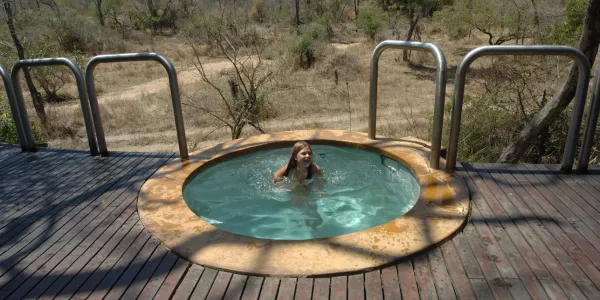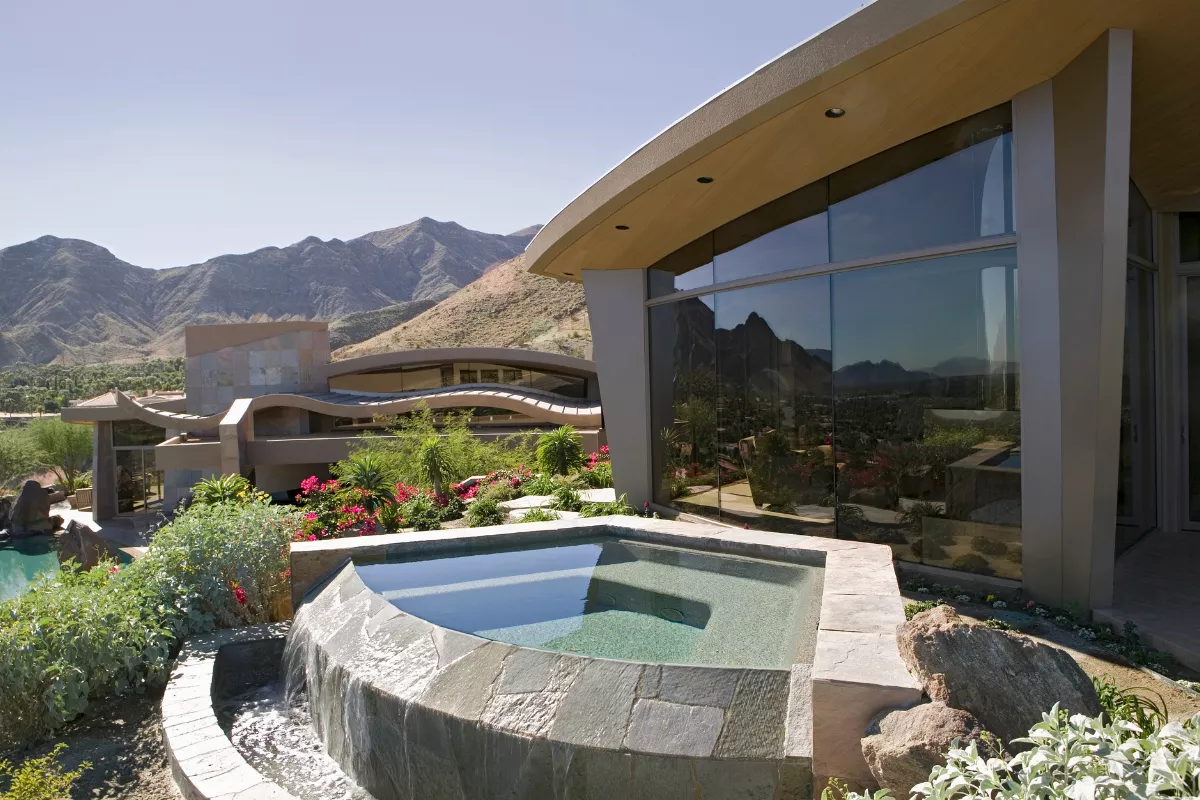Plunge pools have surged in popularity, emerging as a chic and compact alternative to traditional swimming pools. These pools, known for their small footprint, offer a refreshing escape, blending seamlessly into various outdoor spaces, from compact urban backyards to luxurious resort-style landscapes.
Plunge pools offer a distinctive benefit compared to their larger counterparts due to their smaller size, allowing them to serve as a hot tub during the winter and a refreshing pool in the summer when equipped with the right pool equipment.
This makes them an ideal choice for those with limited outdoor space or for individuals who prefer a pool for relaxation rather than swimming or lap exercises.
What is a Plunge Pool?

A plunge pool typically measures 8’ to 12’ in both length and width and maintains a consistent depth of 5’ to 7’. It is essentially a small, shallow pool designed for lounging, cooling off, and light swimming, rather than for exercise or entertainment.
The concept originates from natural pools found at the base of waterfalls, where the water's depth provides a perfect spot for a refreshing dip. Modern plunge pools replicate this experience in a more controlled and accessible manner, offering a serene spot to unwind and beat the heat.
Are Plunge Pools a Good Idea? Pros and Cons
Plunge pools are an excellent addition for those with limited outdoor space or a preference for relaxation over vigorous swimming, offering a space-efficient, versatile, and aesthetically pleasing option.
They are generally more cost-effective to install and maintain than larger pools, can enhance the visual appeal of your garden, and are easier to keep clean due to their smaller size. Additionally, with the option to heat the water, they can be enjoyed year-round.
However, it's worth noting that they may not be suitable for swimming laps or hosting large gatherings, and while they can add a unique feature to your home, the return on investment might not be as significant as with larger pools.
Pros
A Plunge Pool serves as an ideal spot for water-based exercise and rehabilitation. By incorporating jacuzzi jets, you can enjoy a revitalizing massage, or add swim jets for an effectivee resistance workout. Engaging in hydrotherapy and gentle water aerobics within a Plunge Pool can offer enduring health advantages.
Space Efficiency
Plunge pools are perfect for smaller outdoor areas where a full-sized pool is not feasible.
Cost-Effective
Generally, they are less expensive to install and maintain than their larger counterparts, due to their reduced size and water volume.
Aesthetic Appeal
They can be a visually striking addition to your garden or patio, enhancing the overall ambiance of your outdoor living space.
Year-Round Use
With the addition of heating options, plunge pools can be enjoyed throughout the year, regardless of the season.
Cons
Differing from conventional pools, Plunge Pools maintain a uniform depth across their entirety, lacking a shallow section. For households with young kids who aren't proficient swimmers, a Plunge Pool may not be the most suitable choice.
Limited Use
Due to their size, they are not suitable for swimming laps or hosting large pool parties.
Resale Value
While a plunge pool can be an attractive feature for some, it may not significantly increase the resale value of your home compared to a traditional swimming pool.
Maintenance
Despite their smaller size, plunge pools still require regular maintenance to keep the water clean and the pool functioning properly.
Is it Cheaper to Build a Plunge Pool?
Building a plunge pool is generally more affordable than constructing a standard-sized swimming pool. The reduction in materials, labor, and ongoing maintenance costs make it a cost-effective option for those looking to add a water feature to their property without the hefty price tag.
Take the maintenance for example: the costs for plunge pools are generally lower due to the smaller volume of water that needs cleaning. This means fewer chemicals and potentially smaller pool equipment are required to maintain cleanliness.
It's important to consider, however, that installing a pool heater will raise operational expenses, although heating a plunge pool will still consume less energy compared to a standard-sized pool.
We can say that the final cost can vary widely depending on factors such as design complexity, materials, and installation location.
What is the Point of a Plunge Pool?
It is an option for those with lack of space, but wish to have a pool. It provides a cooling sanctuary that is both functional and aesthetically pleasing, without requiring the space or investment of a traditional pool. Plunge pools are particularly appealing for relaxation, hydrotherapy, and as a tranquil focal point in garden design.
People also ask
How deep is a typical plunge pool?
Plunge pools typically range from 4 to 8 feet in depth. If your intention is primarily to sit or stand in the pool, a depth of around 4 or 5 feet might be suitable. However, for those looking to engage in exercise within their plunge pool, opting for a depth between 6 and 8 feet could be more appropriate.
What is the difference between in-ground pool and above-ground?
When it comes to plunge pools, the choice between in-ground and above-ground models can significantly impact the overall expense.
In-ground plunge pools necessitate digging into the earth to embed the pool, as noted by Messner. Alternatively, there's the option for a pool that's partially submerged, which would involve less intensive excavation.
Conversely, above-ground pools rest on the surface of the ground, typically elevated about 4-6 feet, according to Messner. This category encompasses bespoke concrete plunge pools that are elevated or those integrated into raised decks.
Can plunge pools be heated?
Yes, plunge pools can be equipped with heating systems, allowing for year-round use in various climates.

 Marcio Vasconcelos
Marcio Vasconcelos





